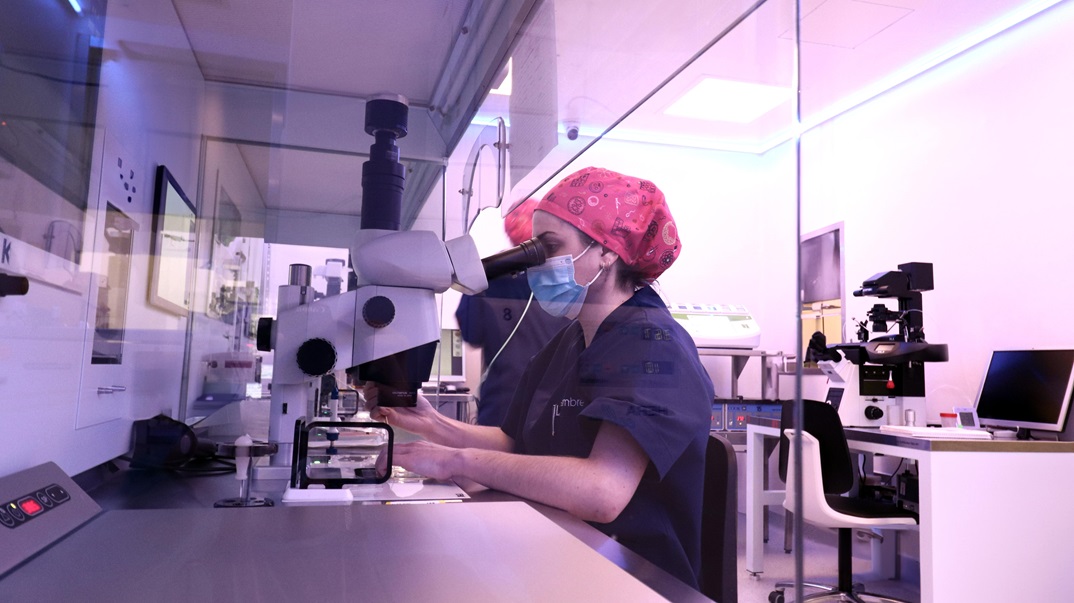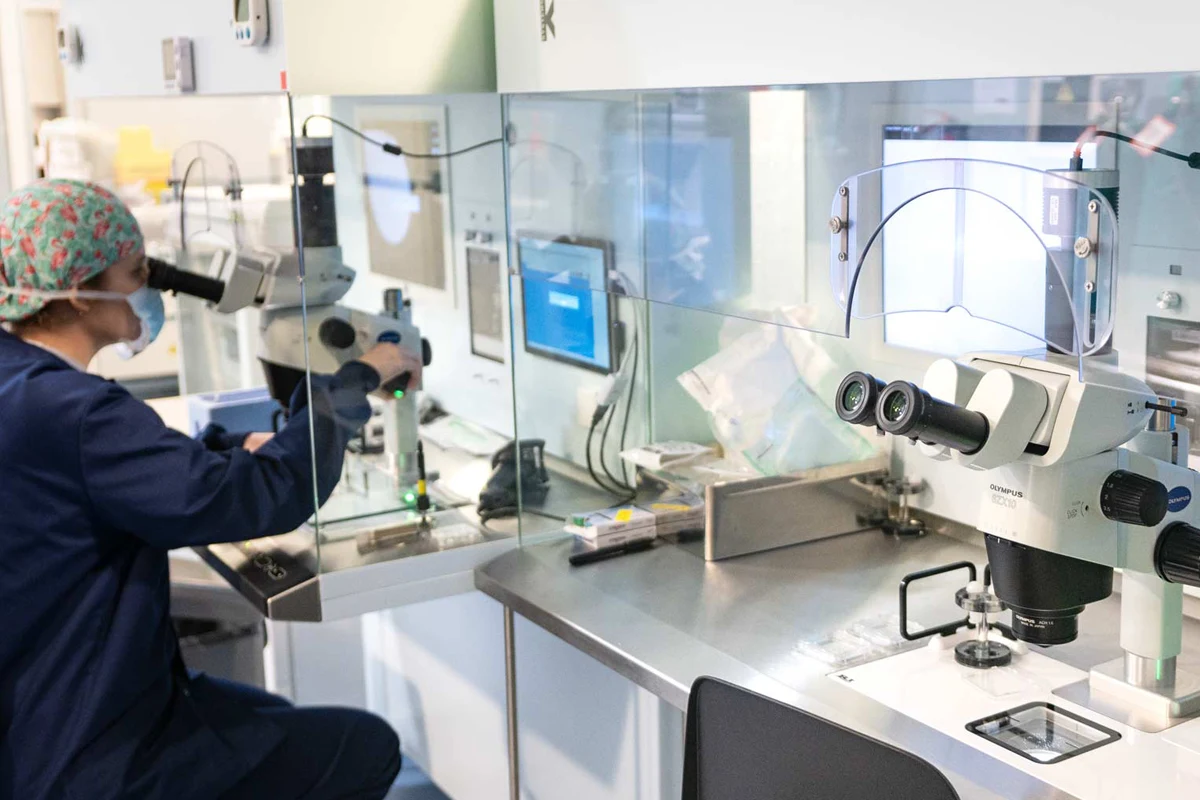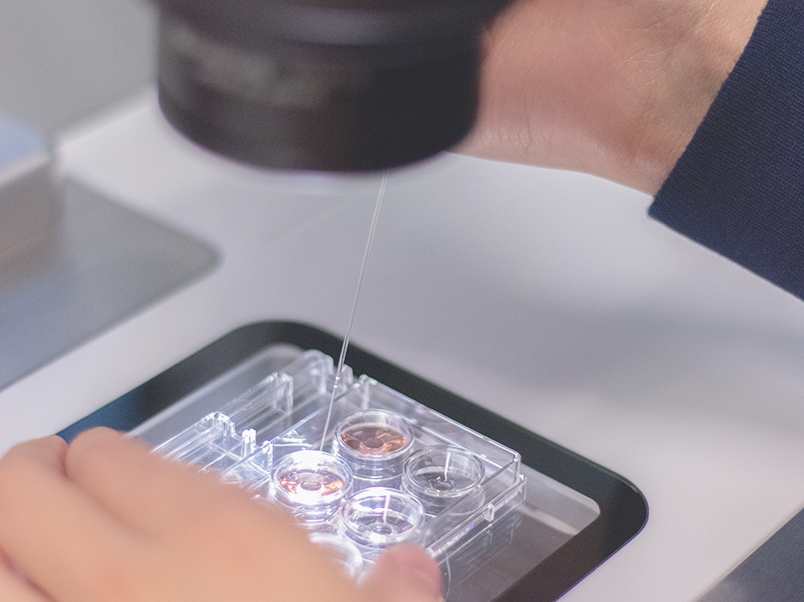Table of contents
Over recent decades, genetics has taken on a fundamental role in the field of assisted reproduction, it allows us to analyze and prevent the transmission of certain diseases, significantly improving the success rates and the health of future babies.
If you want to minimize the possibility of transmitting a hereditary disease to your future child, Tambre offers various genetic tests, such as the Genetic Compatibility Analysis, also known as Genetic Matching, a preventive test that allows us to study 363 hereditary genetic diseases.
Another option we also offer at Tambre is Preimplantation Genetic Diagnosis (PGD/PGT), which should not be confused with Genetic Matching. We will now explain what both tests consist of and who they are recommended for.

Tambre’s Laboratory.
Genetic Compatibility Test
Genetic Compatibility Testing or Genetic Matching can be carried out by any couple seeking pregnancy by natural means or those in need of assisted reproduction treatment. The main objective of this test is to determine the genetic compatibility between both partners in order to identify possible risks of transmitting recessive genetic diseases to their offspring.
When we talk about analyzing genetic compatibility, we are referring to the assessment of carriers. In other words, the Genetic Compatibility Test focuses on identifying whether either of the couple are carriers of recessive genetic mutations.
These are mutations that do not affect carriers, but if both parents are carriers of the same mutation, there is a 25% chance that the future baby will develop the disease, a 50% chance of being a healthy carrier and being able to transmit it to their own offspring, and only a 25% chance of being a baby that neither transmits the disease nor develops it.
Valuable information
This Genetic Compatibility Test allows the study of 363 hereditary genetic diseases, 332 autosomal recessive and 31 X-linked, including severe prevalent diseases and rare diseases such as cystic fibrosis or spinal muscular atrophy. Since most genetic diseases have no cure, being able to detect genetic mutations allows us to make decisions before achieving pregnancy. Thus, depending on the results, we can opt for different approaches to minimize the risk of transmitting hereditary diseases, such as selecting embryos during IVF using Preimplantation Genetic Diagnosis (PGD) or considering using donated gametes.
In this case, it is important to note that at Tambre we can also perform compatibility testing between couples and the donor who provides the egg or sperm.
Family planning
The genetic compatibility analysis therefore does not guarantee to eliminate genetic diseases, but it provides valuable information so that couples can make informed decisions about their family planning. This is particularly important if there is a history of genetic disease or if you already know you are a carrier. Each couple is unique, and genetic compatibility testing is an additional step in the personalized medicine approach to reproductive health that we have developed at Tambre.
Preimplantation Genetic Diagnosis
Another of the genetic tests we perform at Tambre is Preimplantation Genetic Diagnosis (PGD). This is a technique used in assisted reproduction to assess the genetic health of embryos before they are transferred to the uterus during an in vitro fertilization (IVF) cycle. PGD allows us to select embryos that do not present specific chromosomal or genetic abnormalities, thus improving the chances of a successful pregnancy and reducing the risk of transmitting inherited genetic diseases.
Cell biopsy on day 5 or 6 of development
For this, a cell biopsy is performed on the embryo on day 5 or 6 of development. This biopsy involves the removal of some cells from the embryo, usually trophectoderm cells that will develop into the placenta, without adversely affecting embryo development or future implantation.
Screening for trisomies, monosomies or other genetic alterations
The biopsied cells are subjected to genetic analysis to assess for the presence of specific chromosomal or genetic abnormalities. This may include screening for trisomies, monosomies, or other genetic alterations that could affect the embryo’s development. Based on the results of the genetic analysis, embryos that do not have the identified genetic abnormalities are selected. These embryos are the ideal candidates for transfer to the uterus.
Who is it for?
PGD is indicated for couples with a family history of genetic disease, or who have suffered repeated miscarriage or implantation failures. It is also recommended to perform this test when the woman is over 35 years of age, as maternal age is a factor which increases the probability of chromosomal alterations in the offspring. At Tambre, this advanced procedure is an essential tool that allows our specialists to select viable embryos, significantly increasing the chances of a healthy and successful pregnancy.
Types of PGD
Preimplantation Genetic Testing (PGD) comprises several modalities used to evaluate different genetic and chromosomal aspects of embryos prior to their transfer during an in vitro fertilization (IVF) cycle. Here are the main types of PGD:
- PGD-A for Aneuploidies: This preimplantation genetic diagnosis technique helps us detect anomalies in the number of chromosomes, such as chromosomal losses or gains in the embryos, as occurs with trisomy 21, or Down’s Syndrome, where instead of having two chromosomes, there are three.
- PGD-M for Monogenic Diseases: It allows identifying specific mutations related to monogenic genetic diseases, that is, when one member of the couple is a carrier of a hereditary disease, enabling the detection of the gene alteration causing the disease, such as cystic fibrosis.
- DGP-SR Structural Alteration Detection: the objective of this type of PGT-A (Preimplantation Genetic Testing for Aneuploidies) is to detect the presence of abnormal chromosomes due to the incorrect breakage or joining of various segments. These structural chromosomal abnormalities come in many types: deletions, translocations, duplications, insertions, inversions, and ring chromosomes.
The importance of genetics
Genetic testing not only boosts the success rates of fertility treatments, but also ensures a healthier future for new families. At Tambre, we recognize the crucial importance of genetics in this process and that is why we offer these tests when appropriate.
If you are thinking of having a child and want to be as sure as possible of their health, the Genetic Compatibility Test and Preimplantation Genetic Diagnosis can help you detect possible genetic diseases. This valuable information helps us make better decisions.
Contact us
Contact us and make your first appointment now on +44 (0) 20 38 688 650. At Tambre, we will carefully consider your case on an individual basis to determine what diagnostic tests you may need, including genetic tests, in order to offer you the most appropriate treatment for you.



